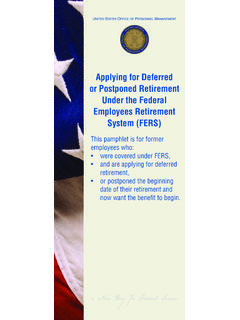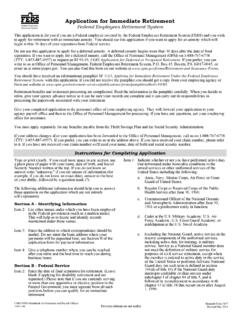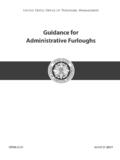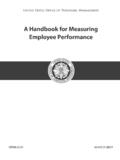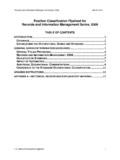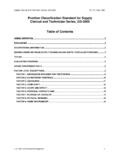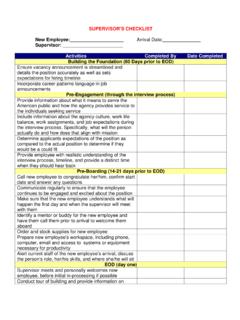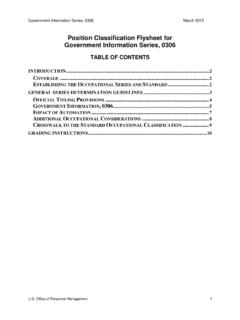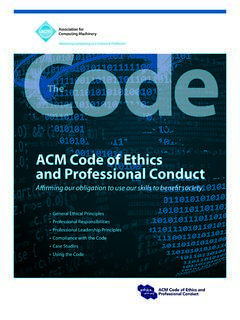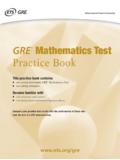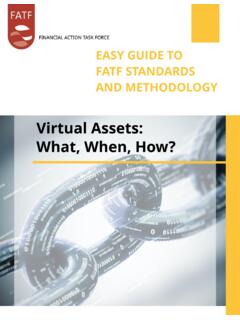Transcription of Court-Ordered Beneits for Former Spouses
1 Court-Ordered Benefits for Former Spouses Civil Service Retirement System Federal Employees Retirement System Federal Employees Group Life Insurance Federal Employees Health Benefits RI 84-1 Revised July 2014 Previous Editions Not Usable July 2014 Table of Contents Page WhatBenefitsCanBeAffectedbya CourtOrder? ..1 WhatBenefitsCannotBeAffectedbya CourtOrder?..2 Do the Same Rules that Apply to Private Sector Employees ApplytoFederalEmployeesandRetirees? ..2 Where Does My Attorney Find the Rules that Apply to Court Orders Affecting CSRS, FERS, FEHB, and FEGLI Benefits? ..3 When Can a Court Require Money be Withheld from a Civil Service Retirement System (CSRS) or Federal Employees Retirement System (FERS) Benefit? ..4 What Happens if Military Service is Used for Civilian Retirement Credit, and There is a Court Order Awarding a Former Spouse a Portion of the Retiring Employees Military Retired Pay?..5 How Can Survivor Benefits be Provided for a Former Spouse?
2 5 What is the Effect of Court-Ordered Benefits Awarded to a Former Spouse on Survivor Benefits for a Current Spouse?..6 Restrictions on Modification of Court-Ordered Survivor Benefits afterRetirement ..6 GarnishmentofBenefits ..6 Federal Employees Health Benefits Program (FEHBP) ..7 Federal Employees Dental and Vision Insurance Program (FEDVIP) ..7 Federal Long Term Care Insurance Program (FLTCIP) ..8 Federal Employees Group Life Insurance (FEGLI) Program ..8 Designations of Beneficiary for Life Insurance and Retirement Contributions .. 9 Whatis theRoleoftheEmployee sAgency? ..9 What is the Role of the Office of Personnel Management (OPM)? ..10 i Additional Information ..12 ii Introduction This informative booklet is for Federal employees or their Spouses who want general information about how their retirement and insurance could be affected by a court order related to a divorce or separation. Attorneys who prepare court orders involving such benefits should be aware of laws and regulations pertaining to court orders, which are available as described on pages 2 and 3.
3 What Benefits Can Be Affected By a Court Order? A court order related to a divorce or separation can 1. Divide a Civil Service Retirement System (CSRS) or Federal Employees Retirement System (FERS) annuity. 2. Divide a refund of CSRS or FERS employee retirement contributions. 3. Provide a survivor annuity payable upon the death of an employee or retiree. 4. Permit a Former spouse to continue coverage under the Federal Employees Health Benefits Program (FEHBP). 5. Require an employee to cover his or her children under the FEHBP. 6. Require an employee or retiree to assign his or her Federal Employees Group Life Insurance (FEGLI) coverage to a Former spouse or children. 7. Require an employee to name his or her Former spouse or children as beneficiaries under FEGLI. In addition, retirement benefits may be garnished for alimony, child support, or for cases involving child abuse. 1 What Benefits Cannot Be Affected by a Court Order?
4 A court order related to a divorce or separation cannot 1. Make a Former spouse of an employee or annuitant eligible for Federal Employees Dental and Vision Insurance Program (FEDVIP) benefits; 2. Require an agency or retirement system to enroll an employee or annuitant in a FEDVIP plan to cover his or her children; 3. Make a Former spouse a qualified relative eligible to enroll in the Federal Long Term Care Insurance Program. Do the Same Rules that Apply to Private Sector Employees Apply to Federal Employees and Retirees? No. The rules governing Federal employees retirement benefits are in title 5 of the United States Code and title 5, part 838, of the Code of Federal Regulations. Court orders that affect private sector pensions are governed by the Employee Retirement Income Security Act (ERISA). However, the Civil Service Retirement System (CSRS) and the Federal Employees Retirement System (FERS) are governmental plans and are exempt from ERISA.
5 Court orders used to divide private sector pension plans, called Qualified Domestic Relations Orders or QUADROS, may not be valid under FERS or CSRS. For example, under ERISA, the Former spouse s share of the benefit can begin when the employee reaches the minimum retirement age, even if the employee is still working. However, this benefit is not available under CSRS or FERS because court orders cannot affect a retirement benefit until the benefit is actually payable to the Former Federal employee. This means the employee must be eligible for the benefit and must have made a proper application for the benefit. Be sure any person drafting a court order intended to affect a Federal employee or annuitant s CSRS or FERS benefit is familiar with CSRS/FERS rules. Court orders affecting Federal Employees Health Benefits (FEHB) are governed by part 890 of title 5, Code of Federal Regulations (CFR). Court orders affecting Federal Employees Group Life Insurance (FEGLI) are governed by 5 CFR part 870.
6 2 Where Does My Attorney Find the Rules that Apply to Court Orders Affecting CSRS, FERS, FEHB, and FEGLI Benefits? The provisions of law that govern CSRS benefits are in sections 8341, 8342, 8345, and 8346, of title 5 of the United States Code. The law governing FERS benefits is in sections 8401, 8424, 8445, 8467, and 8470 of title 5 of the United States Code. The regulations covering both CSRS and FERS benefits are in part 838 of Title 5, Code of Federal Regulations. The regulations contain extensive model language OPM encourages attorneys to use in preparing court orders. A Former spouse may be able to continue Federal Employees Health Benefits (FEHB) coverage if he or she meets the requirements in sections 8901 and 8905 of title 5, United States Code concerning health benefits. The regulations are in subpart H, part 890, of title 5, Code of Federal Regulations. Assignments of Federal Employees Group Life Insurance (FEGLI) are authorized by section 8706 of title 5, United States Code.
7 Regulations are found in subpart I, part 870, title 5, Code of Federal Regulations. Court orders and beneficiaries are found in section 8705 of title 5 United States Code. Regulations are found in subpart H, part 870, title 5, Code of Federal Regulations. These provisions of law, along with the retirement, health insurance, and life insurance regulations, are contained in RI 38-116, A Handbook for Attorneys on Court-Ordered Retirement, Health Benefits, and Life Insurance Under the Civil Service Retirement System, Federal Employees Retirement System, Federal Employees Health Benefits Program, and Federal Employees Group Life Insurance Program. The Handbook is available on the OPM website at OPM s regulations on garnishment may be found in parts 581 and 582 of title 5, Code of Federal Regulations. Please note that a different agency, the Federal Retirement Thrift Investment Board (the Board), administers the Thrift Savings Plan for Federal employees.
8 The Board s regulations governing court orders are in subparts G and I, part 1650, title 5, Code of Federal Regulations. A pamphlet, Court Orders and Powers of Attorney, TSP BK 11 is available from the Thrift Savings Plan, Box 385021, Birmingham, AL 35238. The website for the Thrift Savings Plan is 3 When Can a Court Require Money be Withheld from a Civil Service Retirement System (CSRS) or Federal Employees Retirement System (FERS) Benefit? A court order can apportion or divide a CSRS or FERS benefit as a result of a divorce, legal separation, or annulment of marriage. The court order must expressly direct OPM to pay a portion of the monthly CSRS or FERS benefits. The spouse s share must be stated as a fixed amount, a percentage or a fraction of the annuity, or by a formula whose value is readily apparent from the face of the order and information in our files. The amount cannot exceed the amount payable to the retiree after deductions for taxes and insurance.
9 Payments to a Former spouse from a retiree s annuity end with the retiree s death. For the Former spouse to receive payments after the retiree s death, the retiree must elect, or the court order must provide for, a survivor annuity. A court order may provide that all or part of a refund of employee retirement contributions be paid to the Former spouse. A court order also may block payment of a refund, but only if the order directs OPM not to pay the refund and the order also grants a survivor annuity or a portion of a retiree annuity to a legally separated or Former spouse. Information about sending a court order to OPM and applying for benefits as a Former spouse is provided on page 11 of this pamphlet. 4 What Happens if Military Service is Used for Civilian Retirement Credit and There is a Court Order Awarding a Former Spouse a Portion of the Retiring Employee s Military Retired Pay? Receipt of military retired pay often bars credit for the military service for Civil Service Retirement or Federal Employees Retirement unless the retiring employee elects to waive the military retired pay and have the military service added to civilian service in computing the civilian annuity.
10 If the employee s military retired pay is subject to a court order awarding a Former spouse a portion of the military retired pay, the retiring employee cannot receive credit for the military service for Civil Service Retirement or Federal Employees Retirement without first consenting for OPM to continue payment to the Former spouse. OPM must pay the amount the military pay center would pay the Former spouse if military retired pay continued. How Can Survivor Benefits be Provided for a Former Spouse? A monthly survivor annuity may be payable to a Former spouse after the death of the employee or annuitant if provided by court order. In addition, a retiring employee may voluntarily elect a fully or partially reduced annuity to provide a Former spouse survivor annuity. However, if the employee has remarried, this election may be made only if the current spouse consents to it. A Court-Ordered survivor annuity is not available unless the marriage lasted at least 9 months.
